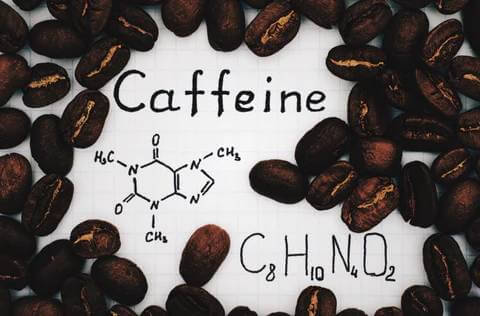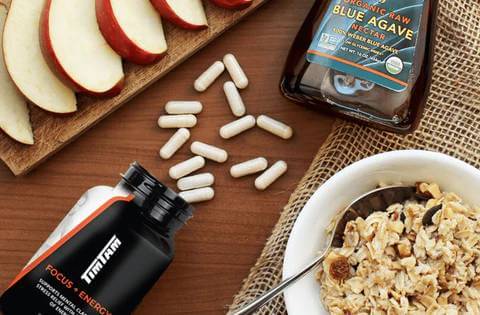Some people maintain their energy and strength through diet and healthy activity. These people do not need - and should not start consuming - caffeine to wake up in the morning or to fight the fatigue that’s often the result of stress, but there are many who will never give up their caffeine.
Coffee, from which most of the world gets its caffeine, is the planet’s most extensively exchanged tropical agricultural commodity. It’s responsible for exports valued at roughly US $15.4 billion, with more than 93 million bags shipped in 2010. However, actual consumption of coffee including countries where it’s grown amounted to nearly 134 million bags. So why does the world’s population love a caffeine buzz?
What is it?
Caffeine (1, 3, 7-trimethylxanthine or C₈H₁₀N₄O₂) is actually a bitter substance that occurs naturally in more than 60 known plants. It can also be created in a lab as a white powder and added to manufactured/processed foods.[¹]


What are the physiological effects of caffeine?2
Central Nervous System (CNS)
Caffeine acts as a neuro-stimulant or psychoactive agent that works by upsetting and blocking adenosine. Adenosine is responsible for many processes, pathways, and regulation of the nervous system. As the day progresses, it builds up in the brain and acts as a depressant by inhibiting the concentration of neurotransmitters, such as: serotonin, dopamine, acetylcholine, norepinephrine and glutamate.¹ That’s why you may feel sleepy or lethargic.
Caffeine mimics adenosine but only in size and shape, and your body can’t differentiate between the two. It attaches to receptors designated for adenosine thereby blocking adenosine’s entry and allowing neurotransmitter concentration to increase. This results in positive effects on mood, energy, focus, and alertness in most, but not all, individuals.¹ When you stop drinking caffeine and its effects begin to wear off, all that blocked adenosine will rush to fill those receptors. You may be pleasantly sleepy at first, but in some cases the result of adenosine rush will make you feel groggy, giving you a good reason to ingest more caffeine.

Athletic Performance
In terms of muscular performance, caffeine has shown to acutely increase muscular endurance and strength following consumption. This is largely due to elevated levels of neurotransmitters, in addition to calcium ion availability in the muscle - facilitating force production. A position statement published by the Journal of the International Society of Sports Nutrition supports evidence that this results in lower perceived exertion, pain, and increased strength and power; in combination with influence on the CNS and adrenal stimulation.¹ ³ Although, further evidence is needed to finalize these conclusions.
Remember, adenosine first acts to transmit energy signals, and as it builds up, it acts to slow us down. Caffeine can stimulate energy but will not slow us down throughout the day. With your central nervous system on “high” all day, it can eventually become overly stressed. It is also important to hydrate. Caffeine is a diuretic and can result in dehydration, even in fluid form, and impede on performance. Therefore, it is important to consume caffeine in moderation and to know the types of caffeine, as well as how much and when to consume it.
Synthetic Vs. Natural Sources
As with anything you put in your body, it is important to know what it is and where it comes from. Caffeine should be no different.
![photo-1593095948071-474c5cc2989d_480x480 (3) (1) (1).jpg]
 Synthetic caffeine is created in a lab in the form of white powder and found in many energy drinks, sodas, pre-workouts, and processed ‘energy boosting’ foods. It is rapidly absorbed in the body and can cause more harm than good in high quantities. Generated from ammonia - found in cleaning products - this cheap source of caffeine can bring on a crash just as fast as it provides the energy.⁴%20or%20were%20unsure.,plant%20products%20like%20natural%20caffeine.)
Synthetic caffeine is created in a lab in the form of white powder and found in many energy drinks, sodas, pre-workouts, and processed ‘energy boosting’ foods. It is rapidly absorbed in the body and can cause more harm than good in high quantities. Generated from ammonia - found in cleaning products - this cheap source of caffeine can bring on a crash just as fast as it provides the energy.⁴%20or%20were%20unsure.,plant%20products%20like%20natural%20caffeine.)
Natural caffeine, on the other hand, comes from plant sources like coffee beans, cacao, guarana, etc.⁵ These natural sources provide a cleaner, sustained release of caffeine that usually is accompanied by vitamins and methylxanthines.⁶ Components not usually found with synthetic caffeine, these vitamins and methylxanthines balance the concentration of caffeine in your system and assist in delivering it to your body in a steady manner.
Recommended Dosage and Timing
Most exercise, sport, and performance related journals have some sort of positioning on caffeine and the quantity for increased mental and physical performance. We found most agree that 3-6 mg/kg of body mass, or about 1.4-2.7 mg/lb, is optimal for increasing performance.¹ Depending on the source of caffeine, it is suggested to consume this caffeine 20-60 minutes prior to workout or competition. However, it is crucial to note that caffeine tolerance and effects are dependent on the person’s age, weight, height, and various other factors that influence response from one person to another. Limit consumption to 6 hours before you go to bed to help reduce risks of insomnia.
It is recommended that you start small to assess your individual tolerance and consult a doctor if you experience any negative side effects or are unsure if it is safe for you.
Negative Effects
- With chronic high use, adenosine receptors will adapt causing a dependency on caffeine, so the more you drink, the more you’ll need it for energy.
- Heavy daily use may eventually lead to adrenal fatigue.
- Caffeine is a vasoconstrictor - it blocks cerebral blood flow, a potentially life threatening condition particularly as we age. This can also lead to a quicker fatigue in muscular endurance due to reduced blood flow to the muscles if taken in capacities higher than your body can handle.
- Some side effects may include increased heart rate or palpitations, headaches, nervousness, anxiety, lightheadedness, increased blood pressure, and more.⁷
Are there any alternatives to caffeine?
If you want to kick the caffeine habit, or simply don’t want to start, but still want its positive effects, try some of the following remedies.
- Ginkgo biloba promotes circulation of oxygen rich blood to the brain creating a stimulating effect without the jittery feeling, and impedes acute clotting in blood vessels.
- Ashwagandha is an adaptogen, an herb that essentially goes where it’s needed and provides help in exactly the right amount. It will help to balance adrenal glands and give an overall sense of well being. Almost a nervous system reset from caffeine!
- Ice water first thing in the morning will cause your body to begin metabolizing at a furious rate to neutralize the temperature.
- A small fruit smoothie with wheatgrass in the afternoon will provide you with simple sugars to boost your energy and boost your metabolism.
- Make sure you’re getting enough calories in your diet, including protein and B vitamins.
- Try Focus + Energy by TimTam. A natural blend of B vitamins and herbs helping support mental focus, energy, and clarity without the crash.

Caffeine in moderation is probably not going to do you any harm, but there may be better ways to increase your alertness and energy levels on a regular basis. Remember, if you’ve been hooked on caffeine for a while, you may experience some withdrawal but your body will eventually adjust and you’ll end up healthier for it. Wean yourself off caffeine slowly and try substituting another beverage in its place.


